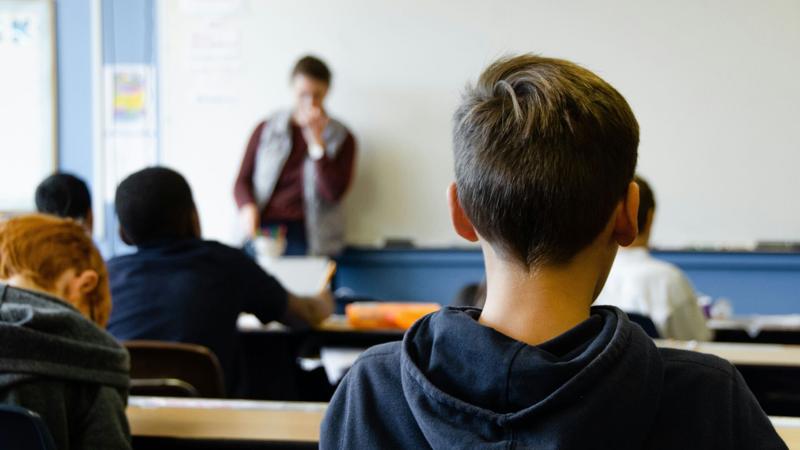(The Center Square) – Temperatures are not the only things heating up in Arizona.
There is also the debate over a new proposal involving Empowerment Scholarship Accounts or vouchers and Proposition 123.
Approved by voters in May 2016, Proposition 123 allows Arizona to use a portion of land trust revenue to direct more funding to public schools without raising taxes. Final language of the new proposal is still being drafted, but state Sen. JD Mesnard, R-Chandler, said it would go before voters and “ensure a few things” for the people of Arizona.
“One, we want to protect school choice, as that is something that Arizona has become the gold standard in,” Mesnard told The Center Square. “We want to make sure families are protected because they’ve been a target recently from some on the left, and in addition, we want to see a significant increase in teacher pay.”
In Arizona, an Empowerment Scholarship Account is an account administered by the state Department of Education. It is funded by state tax dollars to provide education options for students who qualify for an ESA.
Nearly 88,000 students in Arizona are enrolled in ESAs.
“An ESA consists of 90% of the state funding that would have otherwise been allocated to the school district or charter school for the qualified student (does not include federal or local funding),” the Arizona Department of Education states on its website. “By accepting an ESA, the student’s parent or guardian is signing a contract agreeing to provide an education that includes at least the following subjects: reading, grammar, mathematics, social studies and science.”
Funding from an ESA can be used to pay for several things including private school tuition, curriculum fees, home education and tutoring.
Marisol Garcia, president of the Arizona Education Association, said Proposition 123 in its current state has been good for Arizona.
“Prop. 123 gave districts the flexibility to invest in what matters most to their communities — expanding career and technical education, hiring special education teachers, making overdue maintenance, and most commonly, raising salaries to retain the excellent educators our students deserve,” Garcia told The Center Square.
But Garcia said the new proposal “strips local control and redirects Prop 123 funding into a rigid new state-run system” that the education association leader said will decide which teachers deserve raises.
“Ultimately, this plan just creates more bureaucracy – not better outcomes,” said Garcia.
Last week, Garcia appeared at a press conference at the Arizona Capitol to discuss the proposal. Also appearing at the conference were state Sen. Catherine Miranda, D-Laveen; House Minority Whip Nancy Gutierrez, D-Tucson; Dr. Sharon Kirsch of Save Our Schools Arizona and Marcos Moore, president of the Crane Elementary School District Governing Board.
A joint press release from the speakers said the new proposal for Proposition 123 would be bad for Arizonans.
“Educators, public school leaders, advocates and lawmakers will speak out against a Republican proposal in the works that would ask voters to enshrine private and home school ESA vouchers in the Arizona Constitution,” said the group’s press release. “Republicans are reportedly moving forward with a plan that ties the out-of-control and controversial billion-dollars ESA voucher program to the renewal of Prop 123 aid for public schools.”
When asked why some people are so reluctant or hesitant to get behind vouchers, Mesnard said he thinks they, for the most part, see vouchers as a threat to public education.
Describing himself as an “all-of-the=above guy,” one who supports public schools, charter schools, private schools and home schools, Mesnard said it is not a one-size-fits-all that works for families in Arizona.
“The left does seem to be more of a public schools only-type of group, which I think, frankly, is sad,” said Mesnard.
As an association representing Arizona’s public-school educators and communities, the Arizona Education Association “opposes any plan that harms our schools,” Garcia said. She added this new plan threatens the success of Prop. 123, “all to protect a scandal-ridden private school voucher system that has already blown a billion-dollar hole in the budget” in Arizona.
“This proposal has been variously marketed as a plan to increase teacher salaries or expand school choice, but it does neither of those things,” said Garcia. “If it becomes law, it will be nearly impossible to make reforms to Arizona’s troubled and corrupt voucher system, and thousands of educators — early-career teachers, special education specialists, school counselors and others — will be shut out of the raises they deserve.”
Garcia also claimed this proposal will direct more funding to bureaucrats and push qualified educators out of Arizona’s schools.
“We hope that all Arizona voters will reach out to their state lawmakers and share their concerns about this proposal,” said Garcia. “Arizona’s public schools are the cornerstone of our communities, and anything that hurts our schools will hurt our entire state.”
Jason Bedrick, an Arizona resident working as Research Fellow at the Heritage Foundation’s Center for Education Policy, dismissed claims that Arizona’s EPA program has problem or is “fraught with abuse.” According to Bedrick, the ESA program is actually one of the most accountable programs in the state.
“The most recent Arizona Auditor General report ‘found only 1 successful transaction at an unapproved merchant totaling $30’ out of 168,020 approved transactions, for an improper payment rate of 0.001%,” said Bedrick. “Meanwhile, the federal Office of Management and Budget finds that the government-wide improper payment rate was 7.2%.”
“The left likes to throw out words that sound good on paper,” Mesnard said. He cited “accountability” and “transparency” as examples.
“They make accusations that our Empowerment Scholarship Accounts (ESAs), which they refer to incorrectly as vouchers, that that system lacks accountability and transparency, but the truth is it is absolutely accountable to the parent, and they seem to ignore that,” said Mesnard. “I guess they don’t believe or trust that parents will make good decisions for their kids, and so the government has to step in and do that.”
When it comes to district schools, which is where one is presumed to get educated unless he or she has other choices, Mesnard said he understands the need for transparency and accountability.
“I support that, but when you’re talking about a choice like a charter school or a private school that no one has to go there, a parent can go elsewhere if they don’t like what they’re seeing,” said Mesnard. “That means that the idea of accountability really rests with the parents and not with government bureaucrats.”







